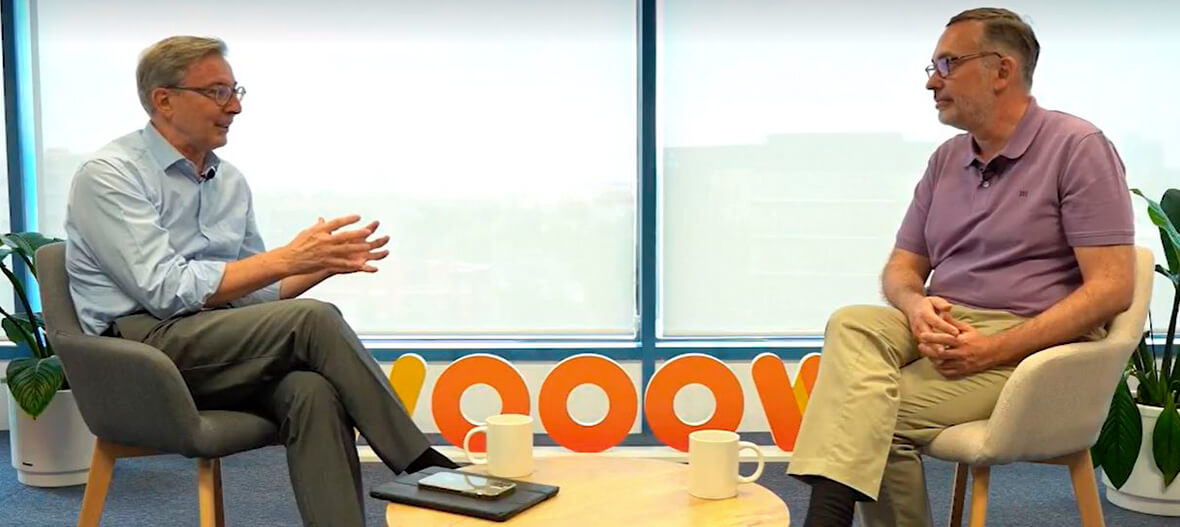Public administration, reality and future
We sit down with Fernando de Pablo, Director of the digital office of Madrid City Council, and Alberto Pérez, Public Sector Director of Babel, to talk about the state of the public administration, reality and future.

Fernando de Pablo, Director of the Digital Office of Madrid City Council, and Alberto Pérez, Public Sector Director of Babel, at the Babel offices in Madrid.
Pandemic as a test of maturity
Alberto Pérez. In a way the pandemic has influenced the development of the e-administration and made us reflect on what we were doing.
Fernando de Pablo. The pandemic has been an example of an opportunity crisis, a tragic opportunity. We have been talking about the importance of electronic relations for many years, ever since Act 11-2007 on Electronic Access of Citizens to the Public Services (LAECSP).
And all of a sudden reality hit us, in just a few days we went from having a very in-person relationship - in most cases - to a fully electronic relationship.
Both the Administration and we the general public have adapted to this hybrid way of life, which has become structural rather than circumstantial.
At that time the digital administration, thanks to technology, deployed its full potential, which has allowed us to interact, study, work from home... It is also true that it has put existing limitations on the table: the digital divide, the digital capacity of electronic entities, interoperability between applications, cybersecurity... there is much work still to be done.
That’s right, these elements became a catalyst for the public administration. A situation that tested us and allowed us to overcome barriers and keep functioning, and we had to adapt over a very short period of time, a time we would have considered impossible in another situation.
This revolution led us to a point of no return. Now citizens are more demanding on digital issues, they want an administration that is always accessible and stable. If we are to provide a quality service, 24 hours a day, seven days a week, we have to work towards that.
The process of digital transformation in the administrations and society has speeded up hugely and we have also become more flexible.
We are never going back on electronic relations between citizens and the administrations. Technology is the means, not the end. Citizens want simple, convenient and fast services; their quality and usability will be the most important feature.
Technologists, companies often think too much about technology, will we use artificial intelligence? The metaverse?... but citizens have simple problems and what they want are simple solutions to their everyday problems.
Challenges, the Coming Administration
We must be able to transfer the "robustness" of the in-person administration to the digital medium, the assurance that everything will work properly.
This revolution affects not only citizens but also the administration, which must create new services. And we must not forget how the Administration's own employees are affected by this process since, increasingly, these professionals are attending to the citizens remotely.
The administrations that have best withstood Covid-19 were those that had their electronic relationship system between citizens and businesses at a very advanced stage.
There were already administrations in which 80% of their relationships were electronic, while others were only at 20%. Now everything has changed.
Electronic relationships have become absolutely universal in public administrations, and this translates into a natural shift towards teleworking, which has gone from almost “being forbidden” to an absolute necessity.
This shift implies a huge change, which mainly affects the culture of organisations and employees, from an in-person and time control culture to one of trust and goal-based work.
Issues which were already there and are coming to light have – now – become pressing. Interoperability between the public administrations is one of them.
This can have a transformational thrust in the administrative system because there are very few procedures that belong to one sole organisation, and if we want to keep citizens from becoming the workflow of a procedure, taking paperwork from one administration to another on their own legs, this must be viewed as an urgent improvement.
Spain is a small-scale Europe owing to the level of administrative decentralisation, and that is highly positive because many of the political decisions are taken closer to the citizens.
But at the same time, we have elements of administrative fragmentation. Interoperability between the administrations must be seen as absolutely essential if we are truly thinking of an Administration focused on the citizens.
Citizens - in my opinion - perceive the Administration as a unitary whole, they don’t care whether a process belongs to the General State Administration, to an autonomous region, to a provincial council or a city hall, what they want are integral, convenient and easy services.
This also relates to the re-engineering of processes.
It is not enough to transfer the world we had on paper to the internet.
You can do things on the web not only much faster, but also much better.
This is why a rethink of administrative procedures is needed in order to simplify them, so that the services are truly more convenient, direct and simple for citizens and, above all, I would say, for businesses, which are perhaps the ones that have the greatest need.
Fernando de Pablo
“The pandemic has been an example of an opportunity crisis” “We will no longer go back on electronic relations between citizens and the administrations”
Citizens and public employees, digital natives
In 10 years there will be digital natives both on one side and the other of the old “counter”, and this generation will not think it reasonable to do much of the paperwork we are used to doing. How do we adapt to that new generation and how do we blur the boundary between front office and back office?
Totally, you said it: digital transformation is a process that is done by people for people. And in this process we cannot generate new digital divides but should instead overcome existing ones.
There are citizens of all ages, and we have public employees of all ages as well.
Right now we have a very important challenge in the public administration, which is generational renewal, the average age of many administrations stands at above 50.
For the next few years we will face a talent renewal challenge, from recruitment to the transfer of knowledge between people who are about to retire and young people who have just entered the workforce.
The role of NextGeneration Funds
All of the above is closely related to the economic factor: increased productivity, fluidity, teleworking, reduced carbon footprint...
At this point I would like to talk about the Next Generation funds, because they will be an accelerator. And here it is important to bear in mind that, in this transformation process, technology is an element that helps in achieving a goal, not the end in itself. It's not about removing one technology and putting another one in its place.
Transformations take time. To what extent can we leverage Next Generation funds for all this that we’re talking about?
European Next Generation funds are a unique opportunity that we cannot squander. In this economic crisis Europe has opted for investment in critical sectors.
In previous crises austerity was the route taken; there is a very important difference that comes to us from Europe, which is why I say that we cannot waste this circumstance.
We have already experienced previous stages of investment, which in some cases have not been sustainable over time.
It is very important for the public administrations as a whole to be capable of investing in those projects that are truly the ones we need, those that will provide better services, that will make us more competitive and that will be sustainable when this stage of European investment ends, in a real way, with no associated marketing.
One concept that seems critical to me, not just because of the Next Generation funds, is continuity in technological transformation policies, which I often compare with road plans that, in order for them to be successfully completed, must be considered in the long term.
Technology projects are temporary and infrastructure projects, so from a political point of view, a government has to be able to launch a complicated project, even knowing that - perhaps - the returns will be obtained by the next government. Technological transformation projects are often long-term projects.
The future
How do we expect the future of the administrations’ transformation to be?
Digital transformation is an essential process for the administrations, and for the country as a whole. It is a necessity that governments have brought to light.
A well-executed digital transformation will bring us a fairer and more sustainable society. In the case of Madrid City Council, we always hold that this has to bring us a more efficient City Council, I believe this is the main obligation, and a more attractive and more competitive city, because we should not forget that an important part of our responsibility has to do with the city, not only with the City Council’s internal operation but also with the city model we want to build. We want a more attractive city with a higher quality of life for its citizens, and a more competitive one from an economic point of view.
Digital transformation and technology have to be valid in achieving all these goals; if technology is not useful for this, then technology is worthless. When asked in a technological context what a smart city is, I always answer: a smart city is a city made by governments that are capable of applying technology for the benefit of their citizens.
Alberto Pérez
“It’s not about removing one technology and putting another one in its place. Transformations take time” “Citizens are now more digitally demanding, they want a permanently accessible and stable administration”
Why are companies failing to implement business agility?
NEXT ARTICLE

